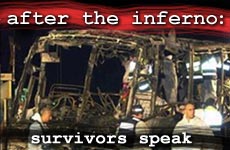 Iran’s Attack on Israel
Iran’s Attack on Israel


3 min read
4 min read
7 min read
7 min read
Survivors of one of Israel's most grisly terrorist attacks speak to Jews of the world -- with words and actions.
These are the fortunate ones. They survived the inferno that enveloped bus 841 after two teenaged Arab terrorists jammed a jeep containing 100 kilos of explosives into the rear of the bus, igniting its fuel supply. Fourteen Israelis were murdered in the October 21 terrorist attack, several of them burned alive in the conflagration.
The deadly projectile stopped at the baby seat, its jagged protrusion tearing into the toddler's liver, but going no further.
The horror of the disaster became clear 24 hours after the attack, when only six of the fourteen bodies had been identified. Professor Yehuda Hiss, head of Israel's Forensic Institute, which receives the bodies after every terror attack, said that seven of the bodies were so mangled and burned that it could take several days to identify them by DNA testing. He added that he couldn't remember an attack after which identifying the bodies was so difficult.
From their hospital rooms in Hadera's Hillel Yoffe Hospital, five of the survivors or their parents answered the question, "What would you like to say to the Jews of the world?"
In what Noam's mother calls, "a huge miracle," the deadly projectile stopped at the baby seat, its jagged protrusion tearing into the toddler's liver, but going no further. Surgeons succeeded in sewing up Noam's liver, which is an organ that regenerates itself. Natti Hane, a former paratrooper who served in Lebanon, had experience in helping injured comrades. While the bus burst into flames beside them, Natti was able, as he put it, "to separate my emotions as a father from my intellect," and give his little daughter first aid.
Natti Hane's statement: "We have only one country: Israel. The terrorism won't beat us into submission. This country is ours. If the Arabs want to be our neighbors and they want to partition the land, that will not come about through violence and bombs that kill innocent people, but only through words."
AFFIRMING LIFE
One more survivor's statement bears reporting, a statement not of words, but of actions. Miri Toubol responded to her sister's death by getting married.
Miri Toubol and Shlomo Ben-Sheetrit were planning to get married last year when Miri's father suddenly died of a heart attack. The newly-religious couple decided to wait to celebrate their wedding until the year of mourning was over. The yahrzeit fell on Monday night-Tuesday, October 21-22. (Hebrew dates go from sundown to sundown.) The wedding was scheduled for Tuesday night at a beautiful catering hall in the desert town of Arad.
When an excited Miri and her mother left the mikveh on Monday evening, they found on their cellphone a message from Miri's only sister, 18-year-old Sharon. Sharon, a soldier in the Israeli army, was calling to tell them the good news that she had been granted leave twelve hours early so that she could be home for her father's yahrzeit commemoration and also help with the wedding preparations. She was calling from the bus on her way home.
Miri and her mother then turned on the radio, and heard the broadcaster's mournful tone. A lethal terrorist attack had been perpetrated on bus 841. Immediately, they dialed Sharon's cellphone. There was no answer. A frantic night of telephoning hospital hotlines followed.
Immediately, Miri and Shlomo cancelled their wedding plans, as the family prepared for a funeral instead.
Tuesday morning they were informed that one of Sharon's military identity badges had been found in the bus's burned wreckage. Immediately, Miri and Shlomo cancelled their wedding plans, as the family prepared for a funeral instead. But time dragged on as Sharon's body was not yet identified. According to Jewish law, the official process of mourning cannot begin until the body is buried.
Then, in conjunction with leading rabbis, Miri and Shlomo made a courageous decision. They would get married right away, before Miri again acquired the halachic status of a mourner. They would affirm life; they would start a new Jewish family and build their new life out of the ashes.
At 2:30 AM in the home of Rabbi Ben-Zion Lipsker, the Chief Rabbi of Arad, in a small, sad ceremony, Miri and Shlomo were married. As Rabbi Lipsker explained the decision to go ahead: "We went by the principle of, ‘In your blood you shall live.' [Ezekiel 16:6] We will not allow the murderers to ruin our lives. [As the Torah states about the Egyptian bondage,] ‘the more they oppressed them, the more they multiplied and grew.' [Ex 1:12] We will build families. We will enlarge families. We belong to this land, and we will get stronger and stronger."
The wedding had an unearthly atmosphere. In the middle of the night, the bride and groom were escorted to the wedding canopy by candlelight, as the few people present sang a Hasidic melody. As Rabbi Lipsker described it: "It appeared as if the angels on high, together with the souls of Sharon and her father, were there with us, watching this amazing sight of the beginning of a new Jewish home. The mother was not there, but when I later told her that her husband and Sharon were there at the wedding, she said, ‘Yes, I felt it.'"
Miri Toubol Sheetrit's wedding is the penultimate survivor's statement.
Please pray for the injured:
Noam bat Ayellet
Ayal ben Miriam
Shalom ben Tamara
Henrik ben Sophia
Avraham Elazar ben Hasifa
Click here to give a donation to help Israeli victims of terror.
